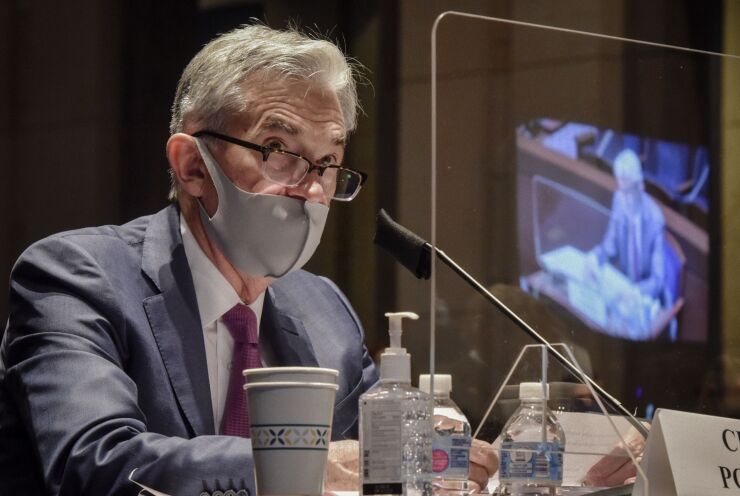The Federal Reserve is reviewing credit standards of its municipal short-term lending program, particularly for territories that are currently locked out of the program.
That’s what Fed Chair Jerome Powell said during a House Financial Services Committee hearing Tuesday. Currently, eligible issuers in its Municipal Liquidity Facility program must have an investment grade rating of BBB-/Baa3 from at least two nationally recognized rating agencies as of April 8, 2020.

“We’re reviewing our credit standards in the Municipal Liquidity Facility at the moment to determine if there is a way to adjust the facility in a way that would make eligible some creditworthy issuers without violating the spirit or letter of Section 13(3),” Powell said.
Section 13(3) of the Federal Reserve Act allows the Federal Reserve Board to engage in emergency lending, limited to programs and facilities with “broad-based eligibility” and defines those.
House Financial Services Committee Chairwoman Maxine Waters, D-Calif., noted changes Powell had made to the MLF, including increasing the population parameters of the program, but said territories, such as Guam, are still locked out.
Powell noted the territories are not investment grade, and were not investment grade before the coronavirus pandemic. He said territories like Guam would still be eligible for other types of lending programs.
In his written testimony, Powell said the MLF, along with other programs, have served as a solid backstop to the economy.
“With the MLF and other facilities in place as a backstop to the private market, many parts of the municipal bond market have significantly recovered from the unprecedented stress experienced earlier this year,” Powell said. “Municipal bond yields have declined considerably, issuance has been robust over the past two months, and market conditions have improved.”
The $500 billion dollar program was created in April with the intention that it would serve as a last resort for issuers. The MLF comes at a premium for issuers — a baseline 150 basis points for triple-A issuers to 590 basis points for below investment-grade-rated issuers.
In a report released by the Fed on Monday, economists said secondary market conditions have stabilized since March. Yields spiked in mid-March and now AAA and AA-rated securities have returned to pre-pandemic levels.
“The path of yields shows the combined effects of two policy actions: changes in the level of interest rates and the impact of Federal Reserve facilities and other government interventions,” the Fed said.
Yield ratios have also returned to their historical norms, which the Fed said was supported by liquidity through its programs such as the MLF, the Money Market Mutual Fund Liquidity Facility and its Commercial Paper Funding Facility.
Outflows from mutual funds have reversed. Inflows reversed in March with outflows of $43 billion. Since the first week of May, those mutual funds have received net inflows each week, the Fed said.
Issuance has also picked up, especially for AAA and AA-rated securities.
On Monday a group of more than 170 organizations signed a letter to Senate leaders Mitch McConnell, R-Ky., and Chuck Schumer, D- N.Y., asking for immediate support to state and local governments.
Many governments’ fiscal years start on June 30 and many have faced budget shortfalls. The letter was penned by the National Association of Counties, National Governors Association, National League of Cities, International City/County Management Association, The United States Conference of Mayors, The Council of State Governments and the National Conference of State Legislatures.
“Unlike the federal government, these state and local governments must begin their fiscal years on time and with a balanced budget,” the groups wrote. “If the Senate fails to act immediately to support state and local governments, our nation’s recovery from the pandemic-induced recession will suffer and millions of Americans will needlessly be harmed.”
Furloughs and job cuts are on the table for many municipalities, they wrote, which affects government services, but also adds to state unemployment.
“The damage will get far worse without federal assistance, forcing drastic cuts that will further delay and cancel infrastructure projects, as at least 26 states have announced construction delays for transportation projects,” the groups said. “The loss of such projects will ripple through states’ construction industry, delaying recovery further.”





